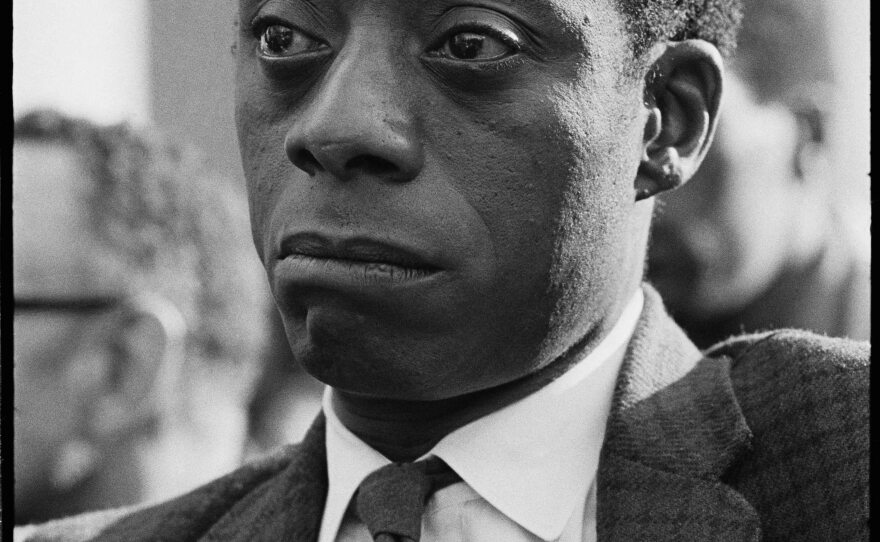Companion viewing
"Eyes on the Prize" (1987)
"Where the Heart Is" (1998)
"Hidden Colors" (2011)
"The Black Panthers: Vanguard of the Revolution" (2015)
"13th" (2016)
Raoul Peck’s “I Am Not Your Negro” just received an Oscar nomination for Best Documentary and it opens at Landmark's Hillcrest Cinemas Friday.
Art may not be able to change the world but it can change a person. The writings of James Baldwin changed Haitian-born Raoul Peck when he was in college.
"He changed my world. He changed my way of thinking, he helped me focus on what was essential and not, and he gave me a structure to lean on and analyze the world I was living in," Peck said in a phone interview.
Now Peck wants us to revisit Baldwin’s words in all their complexity and passion in a new documentary called “I Am Not Your Negro.” The film is taken entirely from Baldwin’s own words and in large part from his unfinished book about the three slain civil rights leaders Medgar Evers, Malcolm X, and Martin Luther King, Jr.
"We have lost most of our important leaders - Medgar Evers, Malcolm X, Martin Luther King, Jr. — they were killed before they were 40," Peck stated. "And [these are] exactly the voices that are missing. I decided that it was about time to come back to Baldwin for this present generation where I felt the voice of Baldwin is so necessary and missing."
Baldwin was born in Harlem in 1924 and as an adult divided his time between France and the United States. He was a prolific writer who broke literary ground exploring race and social issues.
We are at a time in American history when people who speak the truth seem to have a harder time being heard and when racial divisions have become intensified, so a documentary about Baldwin now is especially compelling. More than 50 years ago he pointed out painful truths about race in America. At a Cambridge debate in 1965 Baldwin reacted to Robert Kennedy’s comment about blacks making progress and maybe in 40 years there could be a black president.
"That sounded like a very emancipated statement I suppose to white people. They were not in Harlem when that statement was first heard and did not hear and probably will never hear the laughter and the bitterness and the scorn with which that statement was greeted. From the point of view of the man in the Harlem barbershop, Bobby Kennedy only got here yesterday and now he’s already on his way to the presidency. We have been here for 400 years and now he tells us that maybe in 40 years if you are good, we may let you become president," Baldwin said in archive footage.

He wasn’t trying to place blame but rather trying to show the difference between something whites thought they were giving to blacks versus something that blacks had earned on their own. With ferocious intelligence, Baldwin tried to make the white majority see race from a different perspective, to make them understand how it felt to be black in America, and to not let them think they could avoid criticism by merely claiming they had a black friend.
"That’s where Baldwin puts you, confronts you with reality and tells you, you are part of the problem and specifically the white majority of this country," Peck said.
As a filmmaker, Peck wanted to make sure that nothing got between Baldwin’s confrontational words and the audience.
"I didn’t want anybody in between. I didn’t want any scholar or any interpreter trying to tell what Baldwin is saying or what he means because his words are clear enough," Peck added.
But Peck does place those words over contemporary images. So as Baldwin laments the deaths of innocent blacks in the 1960s, Peck cuts to images of recent deaths of young blacks that committed no crimes yet died at the hands of law enforcement.
"I know how you watch as you grow older and this is not a figure of speech, the corpses of your brothers and your sisters pile up around you and not for anything they have done. They were too young to have done anything. But what one does realize is that when you try to stand up and look the world in the face like you had a right to be here you will attack the entire power structure of the western world," Baldwin stated in a scene from the documentary.
Peck says he wants us to look back from our vantage point today and consider what the civil rights movement accomplished. Did it force structural change or just a cosmetic one? The answer may lie in how timely Baldwin’s critical assessment still sounds today.
In a TV clip, Baldwin said: "I’m terrified at the moral apathy, the death of the heart, which is happening in my country. These people have deluded themselves for so long that they really don’t think I’m human. I base this on their conduct, not on what they say. And this means that they have become moral monsters."
Some reviews of the film describe Baldwin’s words as prophetic. But he was simply critiquing the America he was experiencing and his incisive comments went largely unheeded for more than half a century. That’s not prophetic, that’s infuriating.
"I Am Not Your Negro" (rated PG-13 for disturbing violent images, thematic material, language and brief nudity) is a timely documentary and hopefully Baldwin's words will be listened to more intently now.
Here is a list of Baldwin's books.
You can also check out the following Cinema Junkie Podcasts for Black History Month:
The Black Panthers and Oscar Boycott
Underappreciated Black Filmmakers








